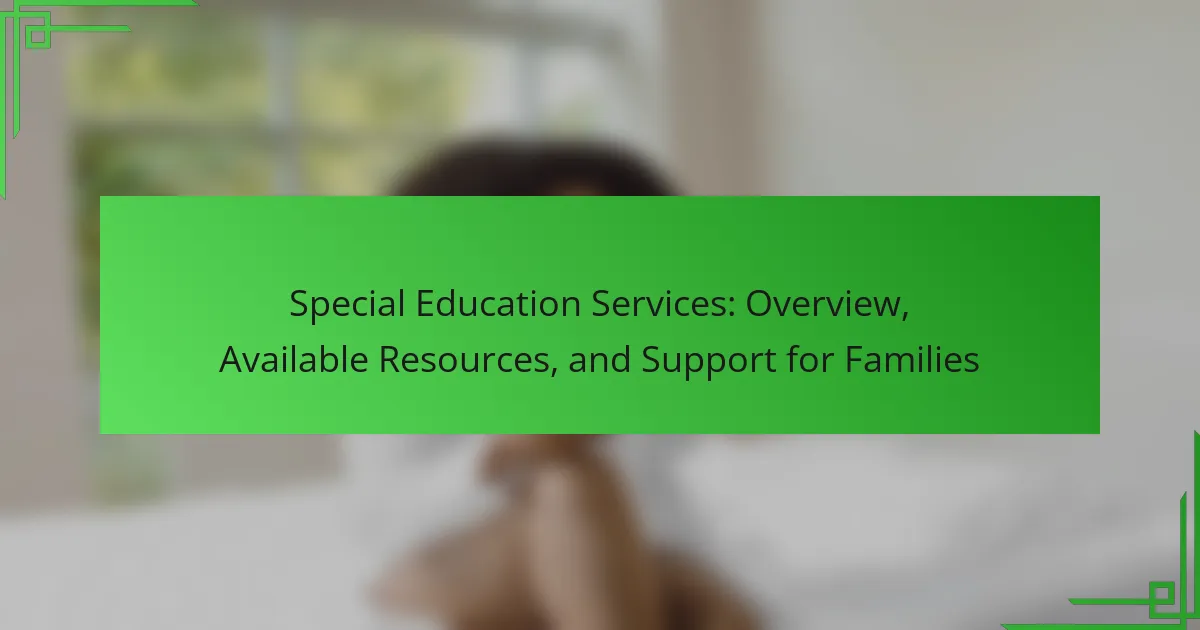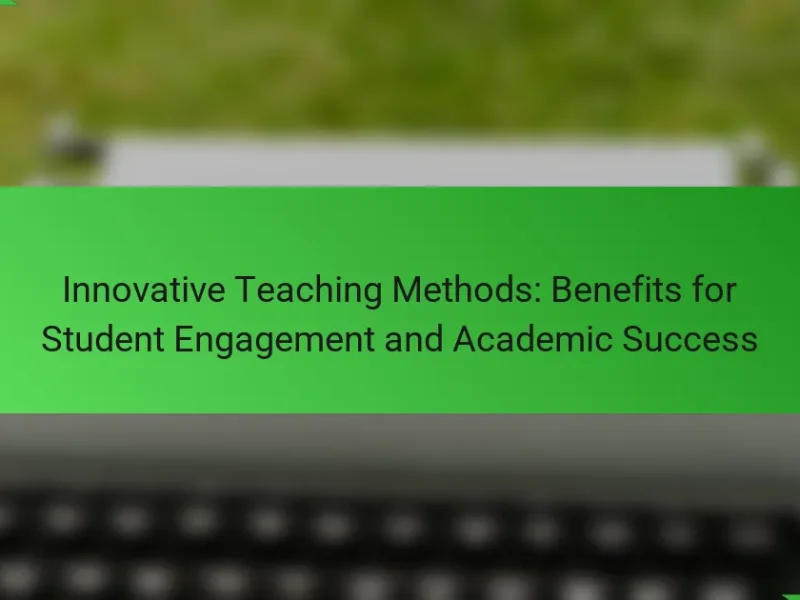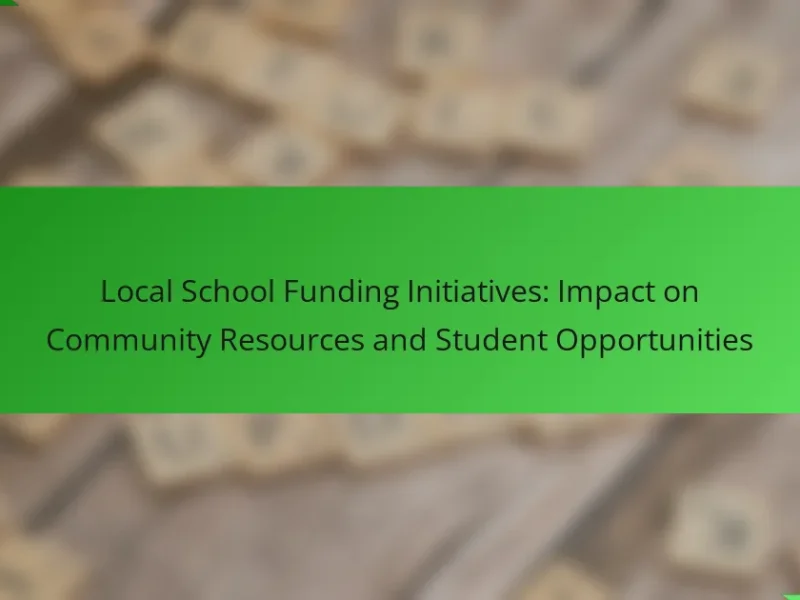Special Education Services are tailored programs designed to support students with disabilities, ensuring they receive individualized instruction and resources. These services include speech therapy, occupational therapy, and behavioral support, all aimed at facilitating access to a free and appropriate public education (FAPE) as mandated by the Individuals with Disabilities Education Act (IDEA). Schools create Individualized Education Programs (IEPs) to set specific goals and accommodations for eligible students. The article also highlights available resources, including federal and state programs, local school district support, and advocacy organizations, which assist families in navigating the special education landscape. Additionally, it emphasizes the importance of parental involvement in supporting children’s educational journeys and the positive impact of creating a conducive learning environment at home.
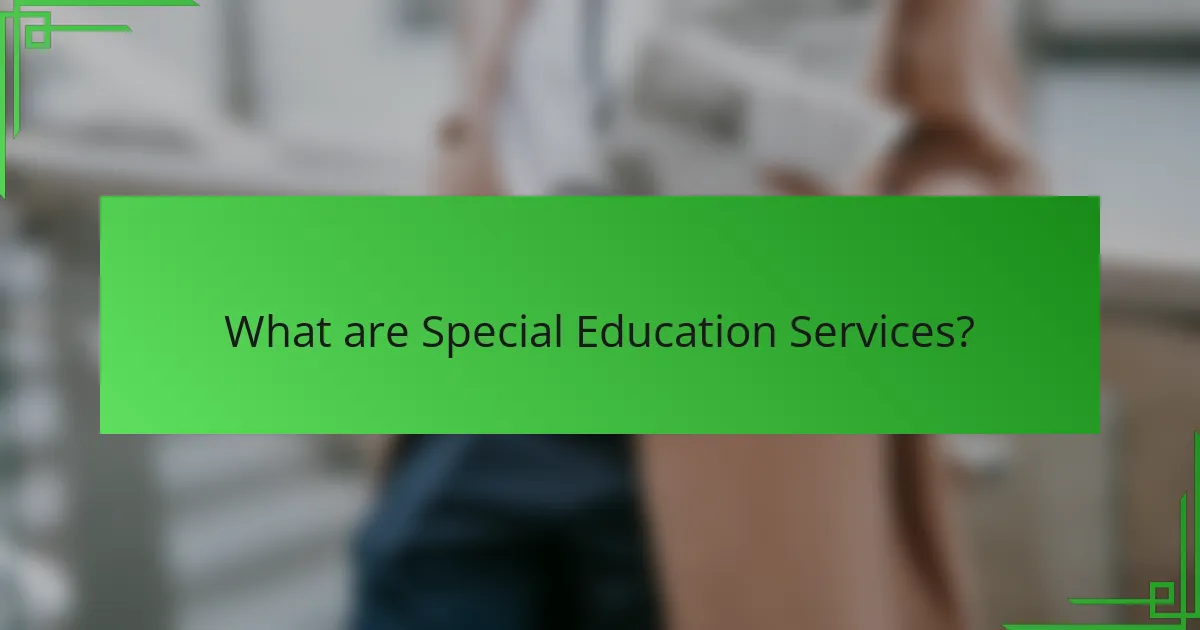
What are Special Education Services?
Special Education Services are specialized programs designed to support students with disabilities. These services aim to provide individualized instruction and resources tailored to each student’s unique needs. They include various forms of assistance, such as speech therapy, occupational therapy, and behavioral support. Special Education Services ensure that students have access to a free and appropriate public education (FAPE). The Individuals with Disabilities Education Act (IDEA) mandates these services for eligible students. Schools develop Individualized Education Programs (IEPs) to outline specific goals and accommodations. This approach helps students succeed academically and socially in mainstream educational settings.
How do Special Education Services support students with disabilities?
Special Education Services support students with disabilities by providing individualized education plans (IEPs). IEPs outline specific learning goals tailored to each student’s unique needs. These services include specialized instruction, accommodations, and modifications in the classroom. Support may involve speech therapy, occupational therapy, or behavioral interventions. According to the Individuals with Disabilities Education Act (IDEA), schools must ensure students with disabilities receive a free appropriate public education (FAPE). This legal framework mandates that services are designed to help students succeed academically and socially. Regular assessments track progress and adjust strategies as needed. Collaboration among educators, parents, and specialists is essential for effective support.
What types of disabilities are addressed by Special Education Services?
Special Education Services address a variety of disabilities. These include specific learning disabilities, such as dyslexia and dyscalculia. They also cover speech or language impairments. Emotional disturbance is another category included in these services. Additionally, autism spectrum disorder is addressed. Other disabilities include intellectual disabilities and orthopedic impairments. Visual impairments and hearing impairments are also recognized. Lastly, multiple disabilities are supported through Special Education Services.
What are the eligibility criteria for receiving Special Education Services?
To receive Special Education Services, a student must meet specific eligibility criteria. The student must have a documented disability that affects their educational performance. Disabilities include specific learning disabilities, autism, emotional disturbances, and other health impairments. The evaluation process involves assessments by qualified professionals. These assessments determine the presence and impact of the disability on learning. The student must also require specialized instruction to benefit from their education. This requirement is outlined in the Individuals with Disabilities Education Act (IDEA). Therefore, meeting these criteria ensures access to tailored educational support.
What are the key components of Special Education Services?
The key components of Special Education Services include individualized education programs (IEPs), specialized instruction, and related services. IEPs are tailored plans that outline specific educational goals for students with disabilities. Specialized instruction adapts teaching methods to meet each student’s unique learning needs. Related services may include speech therapy, occupational therapy, or counseling, which support the student’s overall educational experience. These components ensure compliance with the Individuals with Disabilities Education Act (IDEA), which mandates appropriate education for students with disabilities.
How is an Individualized Education Program (IEP) developed?
An Individualized Education Program (IEP) is developed through a collaborative process involving educators, parents, and specialists. The process begins with assessing the child’s unique needs through evaluations. These evaluations help identify specific learning challenges and strengths. Next, a team convenes to discuss assessment results and draft the IEP. This team typically includes teachers, special education professionals, and the child’s parents.
The IEP outlines personalized goals and objectives tailored to the child’s needs. It also specifies the services and accommodations the child will receive. The team reviews the IEP at least annually to ensure it remains relevant. Adjustments can be made as needed based on the child’s progress and changing requirements. This structured approach ensures that the IEP effectively supports the child’s educational journey.
What roles do educators and specialists play in Special Education Services?
Educators and specialists in Special Education Services play critical roles in supporting students with disabilities. Educators develop and implement individualized education programs (IEPs). They tailor teaching methods to meet each student’s unique needs. Specialists, such as speech therapists and occupational therapists, provide targeted interventions. They work collaboratively with educators to enhance student learning. Regular assessments are conducted to track progress. This data informs adjustments to educational strategies. Together, they create an inclusive environment that fosters academic and social growth. Their combined efforts ensure compliance with legal mandates, such as the Individuals with Disabilities Education Act (IDEA).
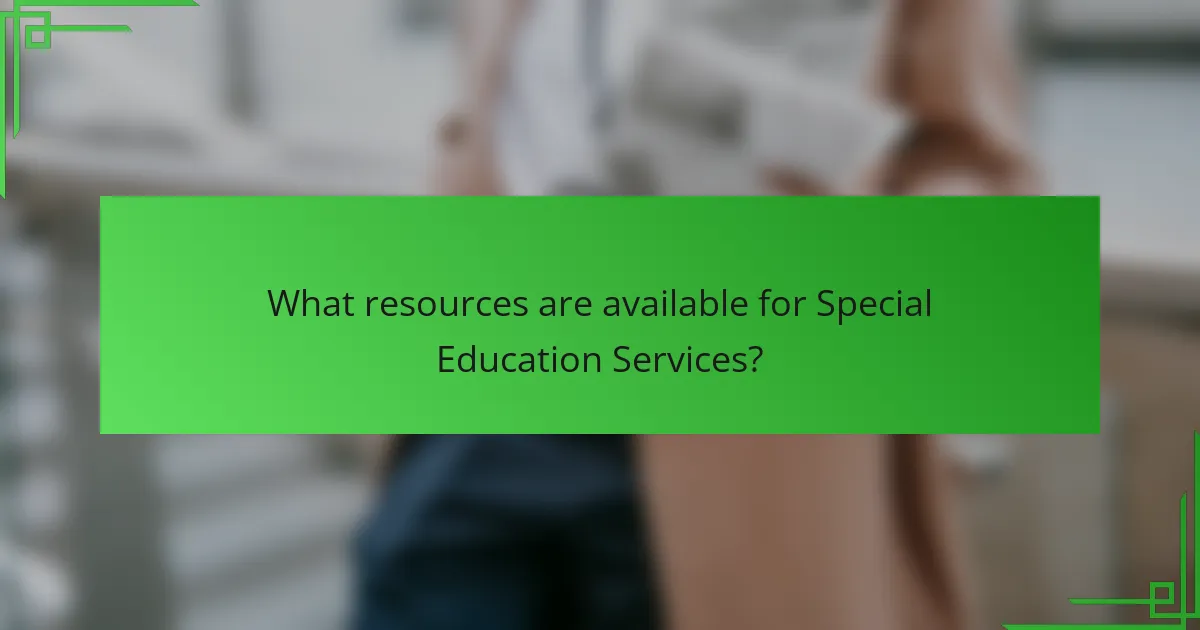
What resources are available for Special Education Services?
Resources available for Special Education Services include federal and state programs, local school district support, and nonprofit organizations. The Individuals with Disabilities Education Act (IDEA) mandates services for eligible students. Local education agencies provide individualized education programs (IEPs). Support groups and advocacy organizations offer guidance and resources for families. Websites like the National Center for Learning Disabilities provide valuable information. Additionally, training programs for educators enhance service delivery. These resources help ensure access to appropriate educational opportunities for students with disabilities.
How can families access Special Education resources?
Families can access Special Education resources through their local school districts. They should contact the special education department to inquire about available services. Each district has a process for evaluating students for special education needs. Families can request an evaluation if they believe their child requires support. Additionally, many states provide online resources and directories for special education services. Organizations such as the National Parent Technical Assistance Center offer guidance and support. Families can also reach out to advocacy groups for assistance in navigating the system. Federal laws, like the Individuals with Disabilities Education Act, ensure access to services for eligible children.
What types of educational materials and tools are available for students?
Educational materials and tools for students include textbooks, workbooks, digital resources, and assistive technology. Textbooks provide foundational knowledge in various subjects. Workbooks offer practice exercises to reinforce learning. Digital resources include online courses, educational apps, and interactive websites. Assistive technology encompasses tools like speech-to-text software and audio books to support diverse learning needs. Visual aids such as charts and flashcards can enhance understanding. Manipulatives like blocks and models facilitate hands-on learning experiences. Each type of material and tool plays a crucial role in addressing different learning styles and needs.
How do technology and assistive devices enhance Special Education Services?
Technology and assistive devices enhance Special Education Services by providing tailored support for diverse learning needs. These tools facilitate personalized learning experiences. For instance, speech-to-text software aids students with writing difficulties. Similarly, text-to-speech applications assist those with reading challenges. Assistive devices like communication boards enable non-verbal students to express themselves. Research indicates that 70% of students using assistive technology demonstrate improved academic performance. Additionally, technology fosters greater engagement through interactive learning platforms. This results in increased motivation and participation in classroom activities. Thus, technology and assistive devices play a crucial role in improving educational outcomes for students with special needs.
What organizations provide support and information for Special Education?
Organizations that provide support and information for Special Education include the National Association of Special Education Teachers (NASET) and the Council for Exceptional Children (CEC). NASET offers resources and advocacy for special education professionals. CEC focuses on improving educational outcomes for individuals with exceptionalities. The Individuals with Disabilities Education Act (IDEA) ensures access to education for students with disabilities. Additionally, the National Center for Learning Disabilities (NCLD) provides resources for families and educators. The National Parent Technical Assistance Center (PTAC) also supports parents of children with disabilities. These organizations play a vital role in disseminating information and resources in the field of special education.
How do advocacy groups assist families navigating Special Education Services?
Advocacy groups assist families navigating Special Education Services by providing guidance and support. They help families understand their rights under the Individuals with Disabilities Education Act (IDEA). Advocacy groups offer resources for developing Individualized Education Programs (IEPs). They assist in navigating the special education system and connecting families with necessary services. Many advocacy groups provide training workshops for parents. These workshops cover advocacy skills and effective communication with school personnel. Research shows that families who engage with advocacy groups report higher satisfaction with services received. These groups often collaborate with schools to improve educational outcomes for children with disabilities.
What online platforms and communities are available for support?
Online platforms and communities available for support in special education include Facebook groups, Reddit forums, and specialized websites. Facebook groups often provide peer support and resources for families navigating special education. Reddit forums allow users to share experiences and advice on specific challenges. Websites like Understood.org and the National Parent Technical Assistance Center offer valuable information and resources. These platforms connect families with others facing similar challenges. Many communities also feature expert advice and articles tailored to special education needs.
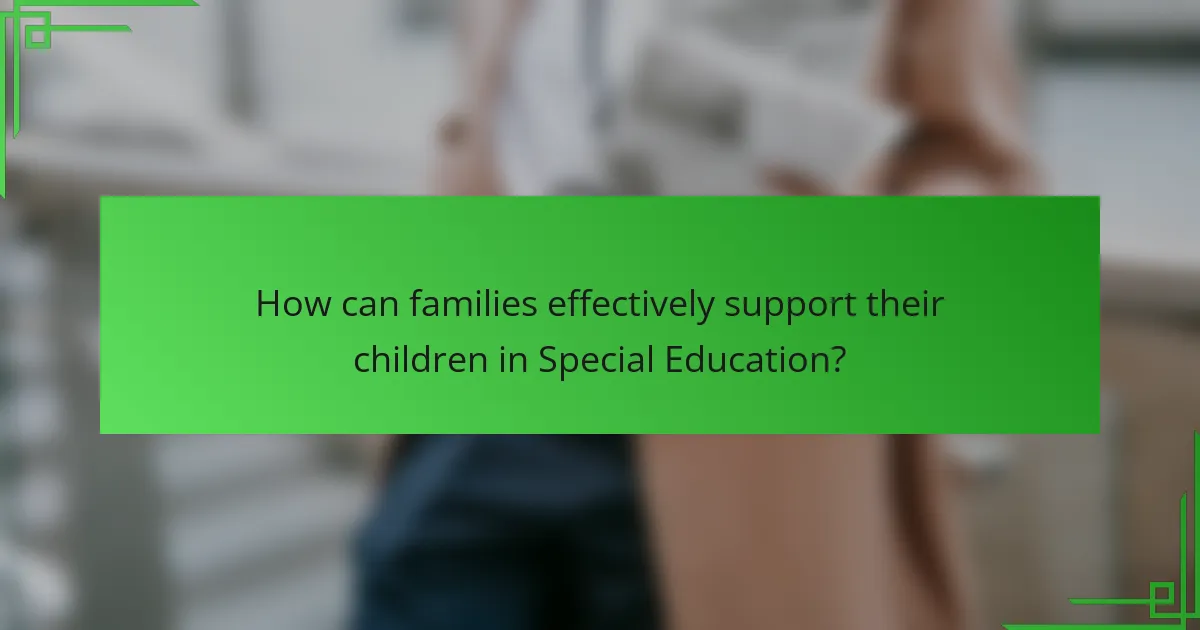
How can families effectively support their children in Special Education?
Families can effectively support their children in Special Education by actively participating in their education. They should communicate regularly with teachers and support staff. This helps in understanding the child’s specific needs. Families should also advocate for appropriate resources and services. Being informed about the Individualized Education Program (IEP) is crucial. Parents can attend IEP meetings to ensure their child’s goals are met. Additionally, creating a supportive home environment aids in learning. Engaging in activities that reinforce skills learned at school is beneficial. Research shows that parental involvement improves educational outcomes for children with disabilities.
What strategies can families use to advocate for their child’s needs?
Families can use several strategies to advocate for their child’s needs. First, they should educate themselves about special education laws and their child’s rights. Knowledge of the Individuals with Disabilities Education Act (IDEA) is essential. This law ensures that children with disabilities receive appropriate education and services.
Next, families should maintain open communication with teachers and school staff. Regular meetings can help address concerns and set goals. Documenting all interactions and keeping records of assessments can provide a solid foundation for discussions.
Additionally, families can involve their child in the advocacy process. Encouraging children to express their needs fosters self-advocacy skills. Collaborating with other parents can also provide support and shared experiences.
Joining local or national advocacy groups can offer resources and guidance. These organizations often provide training and information on effective advocacy techniques.
Finally, families should not hesitate to seek legal advice if necessary. Understanding legal options can empower families to ensure their child’s needs are met.
How can parents effectively communicate with educators about their child’s progress?
Parents can effectively communicate with educators about their child’s progress by establishing regular check-ins. Scheduling meetings or phone calls can provide a dedicated time to discuss concerns. Sharing specific observations about the child’s behavior and performance helps educators understand the context. Utilizing communication tools like emails or school apps can facilitate ongoing dialogue. Parents should ask educators for feedback on academic and social development. Requesting copies of assessments and reports can keep parents informed. Being proactive in communication encourages collaboration between parents and educators. Research shows that strong home-school connections lead to better student outcomes.
What are best practices for collaborating with Special Education professionals?
Effective collaboration with Special Education professionals involves clear communication, mutual respect, and shared goals. Establish regular meetings to discuss student progress and strategies. Utilize each professional’s expertise to develop individualized education plans (IEPs). Engage in active listening to understand diverse perspectives. Foster a team approach by involving parents and caregivers in discussions. Document decisions and action plans for accountability. Continuous professional development enhances collaboration skills. Research shows that effective collaboration improves student outcomes, as indicated by the National Center for Learning Disabilities.
How can families participate in the IEP process to ensure their child’s success?
Families can participate in the IEP process by being actively involved in meetings and discussions. They should prepare by reviewing their child’s educational records and understanding their needs. Families can share insights about their child’s strengths and challenges. They can also advocate for specific goals and services that support their child’s learning. Communication with educators is essential for collaboration. Families should ask questions and seek clarification on any concerns. Research shows that family involvement leads to better student outcomes in special education. Engaging in the IEP process empowers families to contribute to their child’s success.
What common challenges do families face in Special Education, and how can they overcome them?
Families in Special Education commonly face challenges such as navigating complex regulations, accessing appropriate resources, and advocating for their child’s needs. Understanding the Individuals with Disabilities Education Act (IDEA) can help families navigate regulations effectively. Establishing communication with educators fosters collaboration and ensures tailored support. Seeking local support groups provides emotional and practical resources. Utilizing educational advocates can assist families in understanding their rights and options. Research indicates that families who engage actively in their child’s education see improved outcomes. Active involvement can lead to better communication with schools and more effective Individualized Education Programs (IEPs).
What resources are available to help families address these challenges?
Families facing challenges in special education can access various resources. These include local school district services, which provide individualized education programs (IEPs) tailored to each child’s needs. State education agencies also offer guidance and support for navigating special education laws. Non-profit organizations, such as the National Parent Technical Assistance Center, provide training and resources for families. Online platforms like Wrightslaw offer information on special education rights and advocacy. Additionally, community support groups connect families with others facing similar challenges. These resources help families understand their rights and options in special education.
Special Education Services are specialized programs aimed at supporting students with disabilities through individualized instruction and resources. The article outlines how these services provide tailored assistance, including speech therapy and behavioral support, ensuring access to a free appropriate public education (FAPE) as mandated by the Individuals with Disabilities Education Act (IDEA). Key components include the development of Individualized Education Programs (IEPs) and the roles of educators and specialists in facilitating student success. The article also discusses eligibility criteria, available resources, and strategies for families to navigate the special education system effectively.
